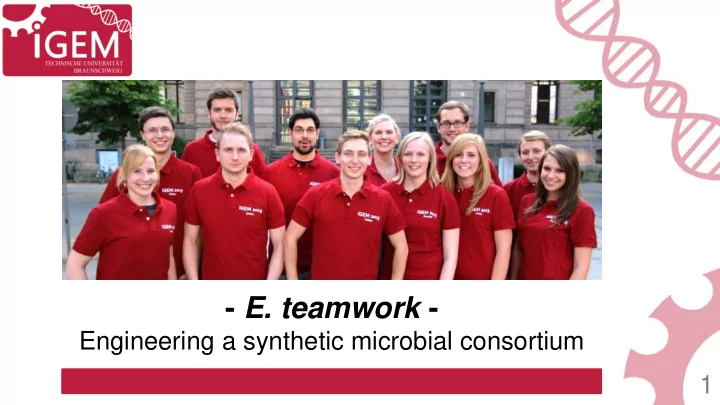

- E. teamwork - Engineering a synthetic microbial consortium 1
2
3
No stable ratio in mixed cultures 4
1 : 1 : 1 Stable ratio necessary! 5
- E. teamwork - Engineering a synthetic microbial consortium 6
Regulation of mixed cultures by Quorum Sensing 7
Quorum Sensing: Communication in bacterial populations Inducible promoter Inactive transcription factor Inducer synthase Inducer 8
Quorum Sensing: Communication in bacterial populations Inducible promoter Inactive transcription factor Inducer synthase Inducer 8
Switching functional QS units creates dependency Rhl Inducible promoter Inactive transcription factor Inducer synthase Inducer Lux Las 9
Switching functional QS units creates dependency Rhl Inducible promoter Inactive transcription factor STO Inducer synthase P Inducer Lux Las 9
Each device consists of 3 operation units Promoter inducible Promoter const. 10
Each device consists of 3 operation units Promoter inducible ampR Promoter Promoter const. const. 10
Each device consists of 3 operation units Promoter Promoter inducible inducible ampR Promoter Promoter const. const. 10
Triangle of dependency Inducible promoter ampR Inactive transcription factor Inducer synthase Inducer ampR ampR 11
Bidirectional dependency Inducible promoter ampR Inactive Red construct transcription factor c Inducer synthase Inducer ampR ampR c Blue construct 11
The BioBrick construct Blue construct: Red construct: - 15 BioBricks - 2 final constructs - 24 new standard devices for Registry 12
Operation Unit 1: Reporters ampR 13
Chromoproteins are convenient reporters ampR E. coli cells in monoculture express the 14 chromoproteins eforRed (left) and aeBlue (right).
Operation Unit 2: Inducible amp resistance ampR 15
Ampicillin resistance is inducible ampR ampR Growth curve of blue construct (+ amp + clavulanic acid) Growth curve of red construct (+ amp) each in 16 each in inducer supplemented and inducer free medium. inducer supplemented and inducer free medium.
Operation Unit 3: Inducer synthase and transcription factor ampR 17
Inducer molecules are produced ampR supernatant supernatant with inducer + detection strain = bioluminescence Blue and red Detection Winson et al. 1998. FEMS Microbiol. Lett. 163 :185 – 192. 18 construct strains 1 and 2
Inducer molecules are produced ampR 400000 350000 realtive light units [-] 300000 250000 200000 150000 100000 50000 0 Supernatants containing inducers trigger a bioluminescence signal in detection strains. 19
Let‘s try! 20
Cross induction is successful Agar diffusion tests Negative control Red construct Blue construct Positive control + supernatant + supernatant (medium (inducer free medium) of blue construct of red construct + synthetic 21 inducer) Cross induction of strains
Cross induction is successful Agar diffusion tests Negative control Red construct Blue construct Positive control + supernatant + supernatant (medium (inducer free medium) of blue construct of red construct + synthetic 21 inducer) Cross induction of strains
Cross induction is successful Agar diffusion tests Negative control Red construct Blue construct Positive control + supernatant + supernatant (medium (inducer free medium) of blue construct of red construct + synthetic 21 inducer) Cross induction of strains
Cultivation at different ratios Blue construct Red construct [%] 90/10 70/30 50/50 30/70 10/90 w/o Amp (non-regulated) 22
Cultivation at different ratios Blue construct Red construct [%] 90/10 70/30 50/50 30/70 10/90 w/o Amp (non-regulated) + Amp (regulated) Pellets of mixed cultures of blue and red construct after 24 h 22 of cultivation with different inoculation ratios.
Achievements Entire project out of existing BioBricks Single operation units are functional Created cross induction of constructs Further evaluation of effects on long term cultivation 23
There is one more thing … 24
Human Practices 25
How can we tell people about synthetic biology??? 25
How can we tell people about synthetic biology??? How to succeed in public relations An easy guide for all iGEM Teams 26
Form a concept – spread the word! 27
Create a recognition value! Strategy Implemen- tation Evaluation 28
Form a concept – spread the word! Strategy Evaluation 29
Where are our fans from? – Social Media Strategy Implemen- tation Evaluation 30
When is the best time to post? – Social Media Strategy 0 Implemen- tation 4 Evaluatio n 8 H o 12 u r 16 20 24 Mon Tue Wed Thu Fri Sat Sun size = frequency lime green = numerous reactions dark red = little reactions 31
Where to place a press release? Strategy Implemen- tation Evaluation 32
How many people have we reached? Strategy Online Evaluation 33
How many people have we reached? Strategy Implemen- tation Social Media Print Online Evaluation 556,598 3,243 6,438 readers in users / users / total month month 34
Check it out! How to succeed in public relations An easy guide for all iGEM Teams For further information contact iGEM@tu-braunschweig.de 2013.igem.org/Team:Braunschweig www.igem-braunschweig.de 35
Acknowledgements Instructors: Tobias Unkauf, M.Sc. Jonas Zantow, M.Sc. DSMZ: Dr. Christian Jogler Christian Bödecker, B.Sc. TU Braunschweig: Prof. Dr. Stefan Dübel Dr. André Frenzel 36
- E. teamwork - Engineering a synthetic microbial consortium
- E. teamwork - Engineering a synthetic microbial consortium
Splitting the work is more efficient Lignocellulose Glucose + Xylose Ethanol + Xylose Eiteman, M.A. et al. (2008) A co-fermentation strategy to consume sugar mixtures effectively. J. Biol. Eng. 2, 3.c
Splitting the work is more efficient Lignocellulose Glucose + Xylose Ethanol Eiteman, M.A. et al. (2008) A co-fermentation strategy to consume sugar mixtures effectively. J. Biol. Eng. 2, 3.c
Recommend
More recommend